 Petzlover
Petzlover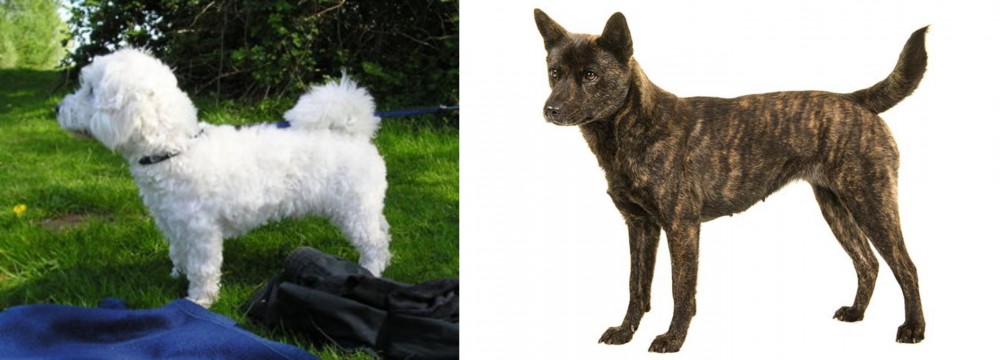 Franzuskaya Bolonka is originated from France but Kai Ken is originated from Japan. Franzuskaya Bolonka may grow 29 cm / 11 inches shorter than Kai Ken. Franzuskaya Bolonka may weigh 17 kg / 37 pounds lesser than Kai Ken. Both Franzuskaya Bolonka and Kai Ken has same life span. Franzuskaya Bolonka may have less litter size than Kai Ken. Franzuskaya Bolonka requires Low Maintenance. But Kai Ken requires Moderate Maintenance
Franzuskaya Bolonka is originated from France but Kai Ken is originated from Japan. Franzuskaya Bolonka may grow 29 cm / 11 inches shorter than Kai Ken. Franzuskaya Bolonka may weigh 17 kg / 37 pounds lesser than Kai Ken. Both Franzuskaya Bolonka and Kai Ken has same life span. Franzuskaya Bolonka may have less litter size than Kai Ken. Franzuskaya Bolonka requires Low Maintenance. But Kai Ken requires Moderate Maintenance
 The Franzuskaya Bolonka in France is known as the Tsvetnaya Bolonka in Russia and in Germany as the Bolonka Zwetna. All of these translate to Colored Bolognese. It is known as the “Pride of Russia” and was rediscovered by the Russians following the thaw of the Cold War. It is also sometimes translated as a colored lapdog.
The Franzuskaya Bolonka in France is known as the Tsvetnaya Bolonka in Russia and in Germany as the Bolonka Zwetna. All of these translate to Colored Bolognese. It is known as the “Pride of Russia” and was rediscovered by the Russians following the thaw of the Cold War. It is also sometimes translated as a colored lapdog.
The Bolonka is a rare breed in the toy category with ancestors in the Bichon Friese line. This little dog looks very much like the national dog of Cuba – the Havanese. In addition to the Bichon other small dogs in this ancestral line include the Shih Tzu, Toy Poodle, and Pekingese as well as the French, Italian and German Bolonka. They are often confused with the Bolognese as both breeds appear in various countries and have many similarities.
In all countries the common name for this dog is the Bolonka. They have a variety of names and nick names depending on the country. In addition to being the “Pride of Russia” he is called a Russian colored Bichon, Czechs call it the Bareyny Bolonsky, the Germans since 1980 have called it the Bolonka Zwetna but the Nordic Kennel Union does not recognize the Zwenta only the Russian Twetnaya.
The French version is seen to be the original with its ancestry dating back to the 18th century when Russian nobles were presented with a Bolonka by Louis XIV of France, and others migrated with the army of Napoleon to Russia. They were still known as the Bolonka of France. Small dogs were not popular in Russia due to the need for dogs that could work on farms and/or hunt. Particularly during the Soviet years, they were considered unnecessary. No Bolonkas were imported to Russia during the Soviet regime, so only localized breeding took place. The goal of breeders in the Soviet Union was to develop a toy dog, lap sized with an apartment living temperament.
During the cold war the Russians sent a pair of breeding Franzuskaya Bolonka to East Germany and they began to develop the breed there as well. At the same time the colored versions of the Bolonka were being bred. The Franzuskaya Bolonka is recognized by the Verband Dur Das Deutsche Hundewesen (VDF) while the other colored breeds are not. The white Bolonka is not recognized by the Federation Cynoloqique Internationale as a breed separate from the Bolognese but as simply another version. Individual clubs throughout the world recognized one or more versions of the Bolonka. They are thought to be the rarest within the Bichon family.
Today’s Bolonka is owed by Prince William and Princess Kate, giving the breed more publicity than it has had in many years.
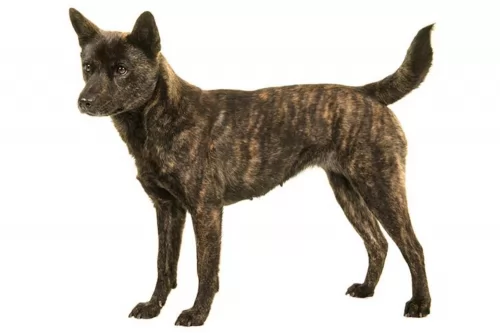 The Kai Ken dog hails from Japan and is both an ancient and rare dog. In fact the dog was discovered in 1929 in the Kai province near Mount Fuji. The dog has the nickname Tora Inu in Japan which means 'Tiger Dog'. Maybe its got to do with the brindle striped coat or his bravery.
The Kai Ken dog hails from Japan and is both an ancient and rare dog. In fact the dog was discovered in 1929 in the Kai province near Mount Fuji. The dog has the nickname Tora Inu in Japan which means 'Tiger Dog'. Maybe its got to do with the brindle striped coat or his bravery.
He falls into the working class category. In 1931, the Kai Ken Aigokai registry was formed to preserve the dog. In fact in this year Dasuke Adachi discovered these dogs and in 1934 was actually designated a Natural Monument in Japan and also protected by law.
The Kai Ken was recognized in 1934 by the Japanese Kennel Club. It is not 100% certain but it is thought that the dog was brought to the United States in the 1950s.
 The Franzuskaya Bolonka is neither heavy boned nor fine boned. They are a toy breed with a moderate bone structure. The ears are neither long nor short and they have tails that touch the back at the tip. Like others in the Bichon family the Franzuskaya Bolonka does not shed. He is a sturdy little dog and the male has a distinct beard and moustache that the females of the breed do not. They have long coats that are wavy and curly. The Franzuskaya Bolonka is of course only white. The Russian version might be brown, red, black, wolf-gray, gray and of course white.
The Franzuskaya Bolonka is neither heavy boned nor fine boned. They are a toy breed with a moderate bone structure. The ears are neither long nor short and they have tails that touch the back at the tip. Like others in the Bichon family the Franzuskaya Bolonka does not shed. He is a sturdy little dog and the male has a distinct beard and moustache that the females of the breed do not. They have long coats that are wavy and curly. The Franzuskaya Bolonka is of course only white. The Russian version might be brown, red, black, wolf-gray, gray and of course white.
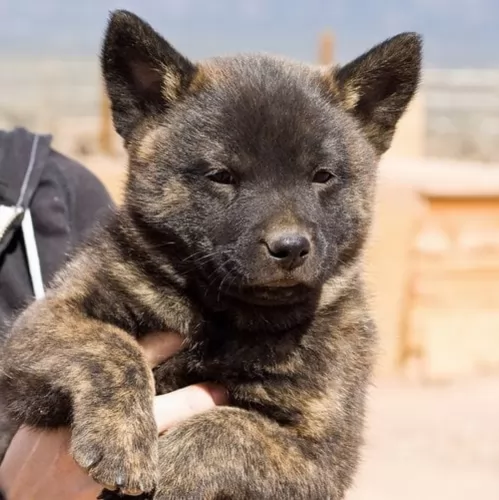 The Kai Ken has always been used for hunting purposes. He comes as recommended for hunting people and those who are active.
The Kai Ken has always been used for hunting purposes. He comes as recommended for hunting people and those who are active.
It is a medium sized dog standing at between 43 to 56cm in height both male and female and weighing between 14 and 22kg.
The ears of the dog are erect, the muzzle is fairly tapered and the nose is black. The tail is bushy like that of a fox and curls over the back. The double coat of the dog is of medium length and harsh and is a brindle color in a reddish or black shade.
Puppies are born black and then the brindle stripe-like pattern comes in later. He has an athletic body and is a keen swimmer.
The Kai Ken is an intelligent dog, loyal to his human family while being somewhat reserved around strangers. They are amicable with both children in the home as well as other pets.
He is a friendly, intelligent dog, forming close bonds with his family. Have him trained and socialized and he'll make you a splendid pet who will be willing to guard you if anyone threatens.
One look at that bright face and you can see that he is an intelligent, independent dog. He is also courageous and fearless and makes a great watchdog, especially because he is naturally reserved and suspicious with strangers.
 The Bolonka is great with kids, just avoid too intense play.
The Bolonka is great with kids, just avoid too intense play.
The Bolonka is a playful, lap dog with a lot of love to offer
Good adaptability great in the city in apartments and great in the country as well
They are very smart and love to learn. Being firm but beyond firm is also kind.
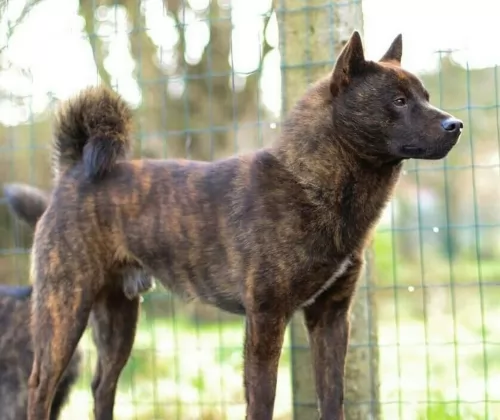 The Kai Ken is a working- and hunting dog, so he is used to being active and will want a home where he can be played with and exercised regularly.
The Kai Ken is a working- and hunting dog, so he is used to being active and will want a home where he can be played with and exercised regularly.
He can be slightly stubborn and independent so training and socialization are imperative. This is also because the dog’s curiosity and his athletic skills can lead to trouble if he isn’t properly trained.
Treat him the way he deserves and you’ll see that he is able to develop a strong bond with you and be altogether an excellent family pet.
 Medical issues are not fully documented because of the rarity of the breed and the years of isolation in the Soviet Union.
Medical issues are not fully documented because of the rarity of the breed and the years of isolation in the Soviet Union.
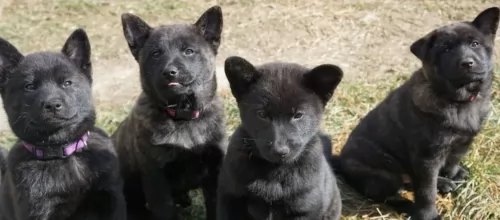 With a lifespan of 14 to 16 years, and given the genetic purity of the Kai Ken, you aren't likely to battle with congenital health problems with your dog, but it is always good to be aware of certain minor health issues that he could succumb to.
With a lifespan of 14 to 16 years, and given the genetic purity of the Kai Ken, you aren't likely to battle with congenital health problems with your dog, but it is always good to be aware of certain minor health issues that he could succumb to.
He can suffer from a few common dog diseases such as progressive retinal atrophy or hip dysplasia.
This is a disease of the eye where there is wasting of certain parts, and in this case the cells of the retina develop abnormally. This can eventually lead to blindness. It’s an inherited disease that can occur in pure- and mixed breeds, and dogs with PRA shouldn’t be used for breeding.
It isn’t a painful condition, and the first symptom usually noticed in a dog is night blindness where you may notice him bumping into things at night and being reluctant to walk around in the dark.
 Feed at least 3 meals a day. Feed one fourth of a cup daily split into three meals of a high quality puppy food.
Feed at least 3 meals a day. Feed one fourth of a cup daily split into three meals of a high quality puppy food.
Feed at least 2 meals per day. Feed one half of a cup daily split into two meals of a high quality dry food.
Fairly healthy breed due to isolation during cold war
The Franzuskaya Bolonka is developed as a lap dog but that does not mean he doesn’t need daily exercise. He loves to play but play gently and not for any length of time. They like to chase balls, play hide and seek and any tricks you want to teach them.
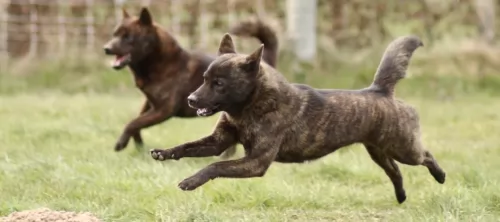 Even though the coat is thick, the Kai Ken will require basic canine care, so a brush twice a week will be enough to keep the coat free of loose hair. He sheds more heavily a couple of times a year and then he will require more brushing.
Even though the coat is thick, the Kai Ken will require basic canine care, so a brush twice a week will be enough to keep the coat free of loose hair. He sheds more heavily a couple of times a year and then he will require more brushing.
He has always been used to hunt so he is a dog that will require regular exercise such as walks, hikes, swimming and ball games.
The nails of the dog should be trimmed regularly once they become long as long nails can be hazardous and can hook onto things, causing injury to the nail area.
The ears of the dog should be checked regularly for fleas and ticks, and teeth should also be brushed with canine toothbrush and toothpaste.